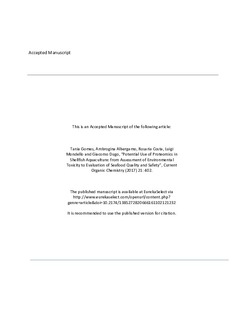| dc.description.abstract | A growing percentage of aquatic production worldwide is derived from aquaculture, whose importance is increasing due to commercial overfishing and a rising consumer demand for seafood. This has led to an increased interest in quality improvement and certification of seafood products to guarantee their safety, quality, authenticity, and nutritional benefits. In this context, proteomics has arisen as a promising tool for unravelling the biological, physiological and ecological traits of seafood products, thus improving cost-effectiveness and sustainability of aquaculture. As one of the fastest growing segments of global seafood production, shellfish farming can directly benefit from the application of these high-throughput technologies in search for biomarkers for the detection of shellfish contamination, health, quality, safety and nutritional value. With this in mind, the goal of this review is to highlight the potential of advanced and high-throughput proteomic tools for the evaluation of environmental toxicity and assessment of quality and safety in shellfish species, relevant both as bioindicators and as seafood products. An overview of the different proteomic approaches will be presented, outlining the main advantages, disadvantages and challenges intrinsic to these techniques. Furthermore, several studies where proteomic techniques were applied for a better understanding of the mechanisms underlying alterations in shellfish proteomes are also described. | nb_NO |
